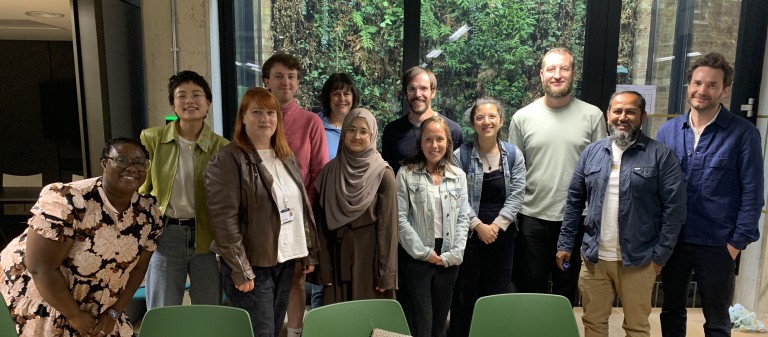PPP and Queen Mary Arts and Culture launch new pilot training programme
By Dr Molly McPhee, Queen Mary Arts and Culture Strategy Manager
On 27 June, Arts and Culture began a new training programme, led by People’s Palace Projects’ Gustavo Möller, to support organisations working in the arts and cultural sectors to make the case for the value of their work to funders, audiences and communities. The workshops were delivered to participants primarily from the East London area – Artsadmin, Bow Arts, Donmar Warehouse, English National Ballet, Mile End Community Project, Spitalfields Music, and Whitechapel Gallery.
This pilot begins a large-scale piece of work in conversation with Arts Council England and the wider arts and culture sector to redress a major gap in tools for arts organisations and individual practitioners to respond to evaluation requirements by funders and other statutory bodies, as well as to advance internal evaluation aims. Following the initial training with arts professionals, Arts and Culture will design and propose a new, practice-based Queen Mary degree apprenticeship in cultural evaluation for East London arts and cultural organisations and artists.
For four full intense days, Gustavo Möller worked with participants to begin to develop a toolkit for evaluative practice tailored to their own organisational aims and needs.
‘The training introduced us to the macro concepts of evaluation through focussing us on specific examples from our organisations – this allowed us to engage in very directive thinking about outcomes, giving us tangible tools to carry out an evaluation project in the next phase of training,’ said Benjamin Lalague of English National Ballet. ‘The sessions were also really clarifying in the way that they helped us see how other teams within our own organisations might need to approach/ think about the evaluation process very differently.’
Drawing from work in communities and with artists and arts organisations, Möller’s approach stems from consultation and collaboration with economists in Brazil, and goes far beyond standard economic and quantitative metrics. PPP’s previous work in this area includes the project Relative Values, which brought together Brazilian and UK organisations Age?ncia de Redes para a Juventude (Agency of Youth Networks), Redes da Mare? (Networks of Mare?), Contact Theatre (Manchester) and Battersea Arts Centre to pilot a research methodology that helps organisations map and narrate their impact on the territories in which they operate.
‘I found it fascinating and inspiring,’ said Dr Richard Martin of Whitechapel Gallery, ‘and you’ve pushed us to think deeply about the evaluation process: this week has stretched me to find a balance between learning about evaluation in a general way and applying it to specific projects at Whitechapel.’
In addition to workshops, the first phase of the programme included a panel conversation with artist and curator Dr Jane Wildgoose of Wildgoose Memorial Library, who spoke on artists conducting independent evaluation projects, and Lucy Perman MBE, consultant to organisations across the sector with expertise particularly within social justice, who discussed theory of change as a key approach to contextualising the evaluation process holistically within arts organisations.
‘The programme has been a huge eye opener for me. … Our work in the community is constant, although we evaluate projects, time is one of our biggest barriers that stops us from carrying in depth evaluations[.] However, this programme has really made me think of the importance of evaluation and how it can be used in order to create further opportunities for our organisation but also to better understand and grow as a community. I enjoyed the way the programme was delivered, the relaxed environment, the diverse range of organisations to share our practises with and to learn from theirs. I am really excited to implement what we have been taught over the past few days and also looking forward to the sessions in the future.’ Nurull Islam of Mile End Community Project
The process is practice-based and happens in three stages:
(1) End of June 2022: a four-day intensive workshop based on co-creation techniques to define a research focus, build indicators and design the research ;
(2) July-August 2022: data collection, through interviews and surveys, conducted by each participant focused on their own work;
(3) Early September 2022: a three-day intensive workshop focused on data analysis and presentation to provide the participant with capacity to share the results in a targeted manner.
Together with the organisations participating in the pilot, PPP and Arts and Culture will make the evaluation programme a collective project, by establishing a data bank for the East London cultural ecology, where shared findings and data generated by the project can help to make a collective case to funders and policy makers. We will also be consulting with major funders, unions and policy makers to ensure that the training being offered speaks to those contexts too.
